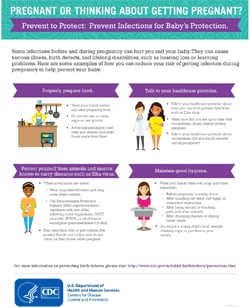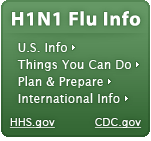
Prevenga defectos de nacimiento: Hable con su médico

Algunas infecciones antes y durante el embarazo pueden hacerles daño a usted y a su bebé. Hable con su proveedor de atención médica sobre cómo reducir el riesgo de contraer una infección durante el embarazo.
Algunas infecciones antes y durante el embarazo pueden causar enfermedades graves, defectos de nacimiento y discapacidades para toda la vida, tales como la pérdida auditiva o los problemas de aprendizaje. Las mujeres pueden disminuir el riesgo de tener un bebé nacido con un defecto de nacimiento al mantener buenas prácticas de higiene durante sus años reproductivos. Esto es importante porque muchos defectos de nacimiento ocurren muy temprano en el embarazo, a veces antes de que una mujer sepa que está embarazada. Alentamos a todas las mujeres y a sus seres queridos a Prevenir para Proteger: Prevenga las infecciones para proteger al bebé.
Temas a discutir con su proveedor de atención médica:
- Zika: El virus del Zika puede pasar de una mujer embarazada a su bebé en desarrollo y causarle defectos de nacimiento. Si está embarazada o está tratando de quedar embarazada, no visite las áreas con zika. Hable con su médico acerca de sus planes de viaje si está planeando quedar embarazada en un futuro cercano. CDC recomienda esperar a quedar embarazada después de viajar a un área con zika. Para más información sobre el zika, visite https://espanol.cdc.gov/enes/zika/index.html.
- Enfermedades de transmisión sexual (ETS): Las ETS pueden tener graves efectos tanto en usted como en su bebé en desarrollo. Usted puede prevenir las ETS al estar en una relación monógama a largo plazo con una persona que haya obtenido un resultado negativo en una prueba de detección de ETS, y al usar condones de látex de la manera correcta cada vez que tenga relaciones sexuales. Hable con su proveedor de cuidados médicos acerca de más formas de prevenir las ETS antes y durante el embarazo. Para más información sobre las ETS y el embarazo, visite: https://www.cdc.gov/std/spanish/embarazo/default.htm
- Sífilis: Si está embarazada y tiene sífilis, puede pasarle la infección a su bebé en desarrollo. Tener sífilis puede llevar a que el peso del bebé sea bajo al nacer. También puede aumentar las posibilidades de que dé a luz demasiado temprano o de que el bebé nazca sin vida. Para proteger a su bebé en desarrollo, usted debe hacerse la prueba de sífilis durante el embarazo y en el parto para recibir tratamiento inmediato si sus análisis dan positivo. Para más información sobre la sífilis, visite: https://www.cdc.gov/std/spanish/sifilis/stdfact-congenital-syphilis-s.htm
- Vacunas: Si está embarazada, planeando un embarazo o acaba de tener un bebé, hay vacunas que puede necesitar para protegerse a sí misma y a su bebé. Por ejemplo, los CDC recomiendan que se vacune contra la tosferina y la influenza (gripe) durante cada embarazo. Asegúrese de tener sus vacunas al día antes de quedar embarazada y hable con su proveedor de atención médica sobre cualquier otra vacuna que pueda necesitar durante el embarazo. Para obtener más información sobre las vacunas y el embarazo, visite: https://espanol.cdc.gov/enes/flu/protect/vaccine/qa_vacpregnant.htm
- Medicamentos: Puede contraer una infección bacteriana durante el embarazo, como una infección de las vías urinarias, que requiera tratamiento con un antibiótico. Aunque se sabe que algunos medicamentos son seguros, hay otros que pueden causar daño cuando se toman durante el embarazo. Hable con su proveedor de atención médica antes de tomar cualquier medicamento recetado, de venta libre, suplementos alimentarios o herbarios durante el embarazo. Para obtener más información sobre el uso de medicamentos durante el embarazo, visite: https://www.cdc.gov/pregnancy/spanish/meds/
Actividades de los CDC: Defectos de nacimiento
Los CDC trabajan para identificar las causas de los defectos de nacimiento, encontrar oportunidades para prevenirlos y mejorar la salud de aquellos que tienen defectos de nacimiento.
- Seguimiento: Los CDC están siguiendo la propagación del virus del Zika y estudiando los vínculos entre el zika y los defectos de nacimiento. Además, los CDC proveen fondos a 14 estados para el seguimiento de los principales defectos de nacimiento.* Los sistemas estatales utilizan los datos para ayudar a guiar las actividades de prevención de defectos de nacimiento y remitir a los niños con defectos de nacimiento a los servicios necesarios.
- Investigación: Los CDC proveen fondos a los Centros para la Investigación y Prevención de Defectos de Nacimiento,* que colaboran en grandes estudios como el Estudio Nacional de Prevención de Defectos de Nacimiento* (nacimientos de 1997 al 2011) y el Estudio de Defectos de Nacimiento para Evaluar la Exposición al Embarazo,* también llamado BD-STEPS, que comenzó en el 2014. Los investigadores de estos estudios trabajan para identificar lo que puede aumentar o disminuir el riesgo de tener un bebé con un defecto de nacimiento. Otras investigaciones de los CDC se centran en el uso de los servicios de salud y en los resultados de salud a largo plazo para las personas que tienen defectos de nacimiento y los costos asociados a estos defectos.
- Prevención: Los CDC y sus socios utilizan lo que aprenden a través de la investigación para ayudar a prevenir defectos de nacimiento.
- Ácido fólico: Tomar suficiente ácido fólico (una vitamina B) antes y durante las primeras semanas de embarazo reduce en gran medida el riesgo de defectos de nacimiento graves en el cerebro y la columna conocidos como espina bífida y anencefalia. La prevención de muchos de estos defectos de nacimiento se vio favorecida por una norma de 1996, por la cual se agregó ácido fólico a muchos alimentos.
- Atención médica antes de la concepción: Los CDC y sus socios también trabajan para educar a las mujeres sobre la importancia de la salud antes del embarazo a través de la campaña “Demuestra tu Amor” (Show Your Love).*
- Mejorar la vida de las personas que tienen defectos de nacimiento: Los bebés que tienen defectos de nacimiento con frecuencia necesitan cuidados especiales y tratamiento para sobrevivir y prosperar. Los sistemas de detección de defectos de nacimiento son una forma de identificar a niños y remitirlos a los servicios que necesitan tan pronto como sea posible. La intervención temprana (tratamiento para retrasos en el desarrollo físico y mental, y en el habla/lenguaje) es vital para ayudar a los bebés que tienen un defecto de nacimiento a alcanzar su máximo potencial.
* Los enlaces a sitios web pueden llevar a páginas en inglés o español.
Prevent Birth Defects: Talk to Your Doctor | Features | CDC
Prevent Birth Defects: Talk to Your Doctor

Some infections before and during pregnancy can hurt both you and your baby. Talk to your healthcare provider about how to reduce your risk of getting an infection during pregnancy.
Some infections before and during pregnancy can cause serious illness, birth defects, and lifelong disabilities, such as hearing loss or learning problems. Women can lower their risk of having a baby born with a birth defect by following some basic health guidelines throughout their reproductive years. This is important because many birth defects happen very early during pregnancy, sometimes before a woman even knows that she is pregnant. We encourage all women and their loved ones to Prevent to Protect: Prevent infections for baby’s protection.
Topics to Discuss With Your Healthcare Provider
- Zika: The Zika virus can be passed from a pregnant woman to her developing baby and cause birth defects. If you are pregnant or trying to become pregnant, do not visit areas with Zika. Talk to your doctor about your travel plans if you are planning to get pregnant in the near future. CDC recommends waiting to get pregnant after traveling to an area with Zika. For more information about Zika, visit the CDC's Zika Virus website.
- Sexually Transmitted Diseases (STDs): STDs may have serious effects on both you and your developing baby. You can prevent STDs by being in a long-term monogamous relationship with a partner who has been tested for STDs and has a negative test result, and by using latex condoms the right way every time you have sex. Talk to your healthcare provider about more ways to prevent STDs, before and during pregnancy. For more information about STDs and pregnancy, visit CDC's STDs website.
- Syphilis: If you are pregnant and have syphilis, you can give the infection to your developing baby. Having syphilis can lead to a low birth weight baby. It can also make it more likely you will deliver your baby too early or stillborn. To protect your developing baby, you should be tested for syphilis during your pregnancy and at delivery and receive immediate treatment if you test positive. For more information about syphilis, visit CDC's syphilis webpage.
- Vaccines: Whether you are pregnant, planning a pregnancy, or just had a baby, there are vaccines you may need to protect yourself and your baby. For example, CDC recommends that you get a whooping cough and a flu vaccine during each pregnancy. Make sure that you are up-to-date with vaccinations before getting pregnant and talk to your healthcare provider about any other vaccines that you may need during pregnancy. For more information about vaccines and pregnancy, visit CDC's Pregnancy and Vaccination website.
- Medications: You may develop a bacterial infection during pregnancy, such as a urinary tract infection (infection of the bladder and kidneys) , which requires treatment with an antibiotic. While some medicines are known to be safe and others are harmful when taken during pregnancy, the safety or risk of most medicines is not known. Talk to your healthcare provider before taking any prescription or over-the-counter medicines, or dietary or herbal supplements during pregnancy. For more information about medicine use in pregnancy, visit CDC's Treating for Two website.
CDC Activities: Birth Defects
CDC works to identify the causes of birth defects, find opportunities to prevent them, and improve the health of those living with birth defects.
- Tracking: CDC is tracking the spread of Zika virus and studying the links between Zika and birth defects. In addition, CDC funds 14 states to track major birth defects. State systems use the data to help guide birth defects prevention activities and refer children affected by birth defects to needed services.
- Research: CDC funds the Centers for Birth Defects Research and Prevention, which collaborate on large studies such as the National Birth Defects Prevention Study (births 1997-2011) and the Birth Defects Study To Evaluate Pregnancy exposureS, also called BD-STEPS, (began in 2014). Researchers on these studies work to identify things that may increase or decrease the risk of having a baby with a birth defect. Other CDC research focuses on health services use and long-term health outcomes for people who have birth defects, and the costs of birth defects.
- Prevention: CDC and its partners use what they learn through research to help prevent birth defects.
- Folic acid: Getting enough folic acid (a B vitamin) before and during the early weeks of pregnancy greatly reduces the risk of serious birth defects of the brain and spine known as spina bifida and anencephaly. A 1996 policy to add folic acid to many foods helps to prevent many of these birth defects.
- Preconception care: CDC and its partners also work to educate women about the importance of preconception (before pregnancy) health through a campaign called Show Your Love.
- Improving the lives of individuals with birth defects: Babies who have birth defects often need special care and treatment to survive and thrive. Birth defects tracking systems provide one way to identify and refer children for services they need as early as possible. Early intervention (treatment for delays in physical and mental development, and in speech/language) is vital to help babies born with a birth defect reach their full potential.


































No hay comentarios:
Publicar un comentario